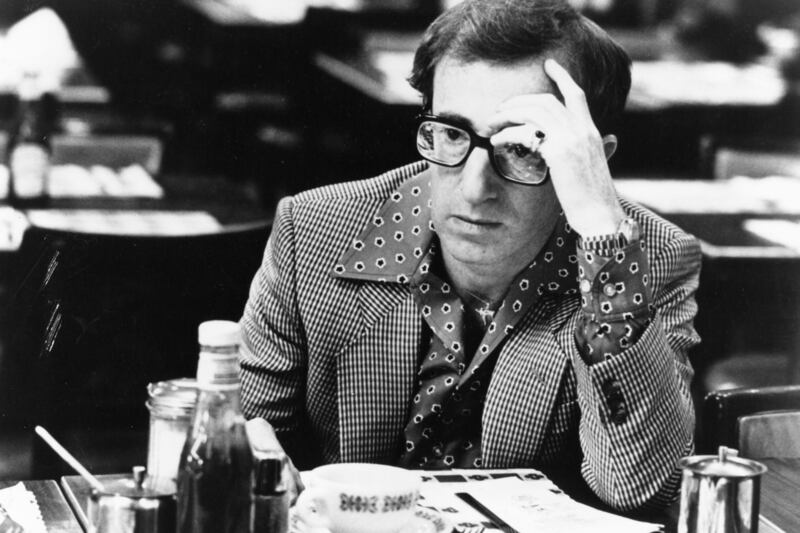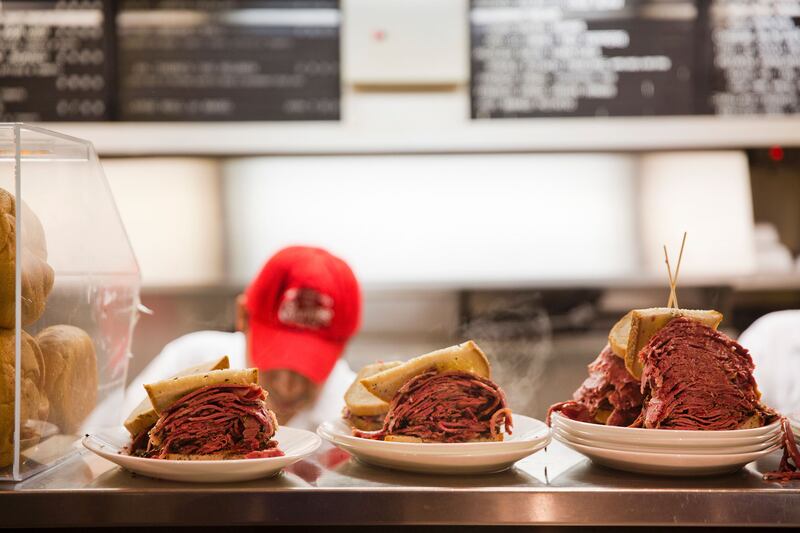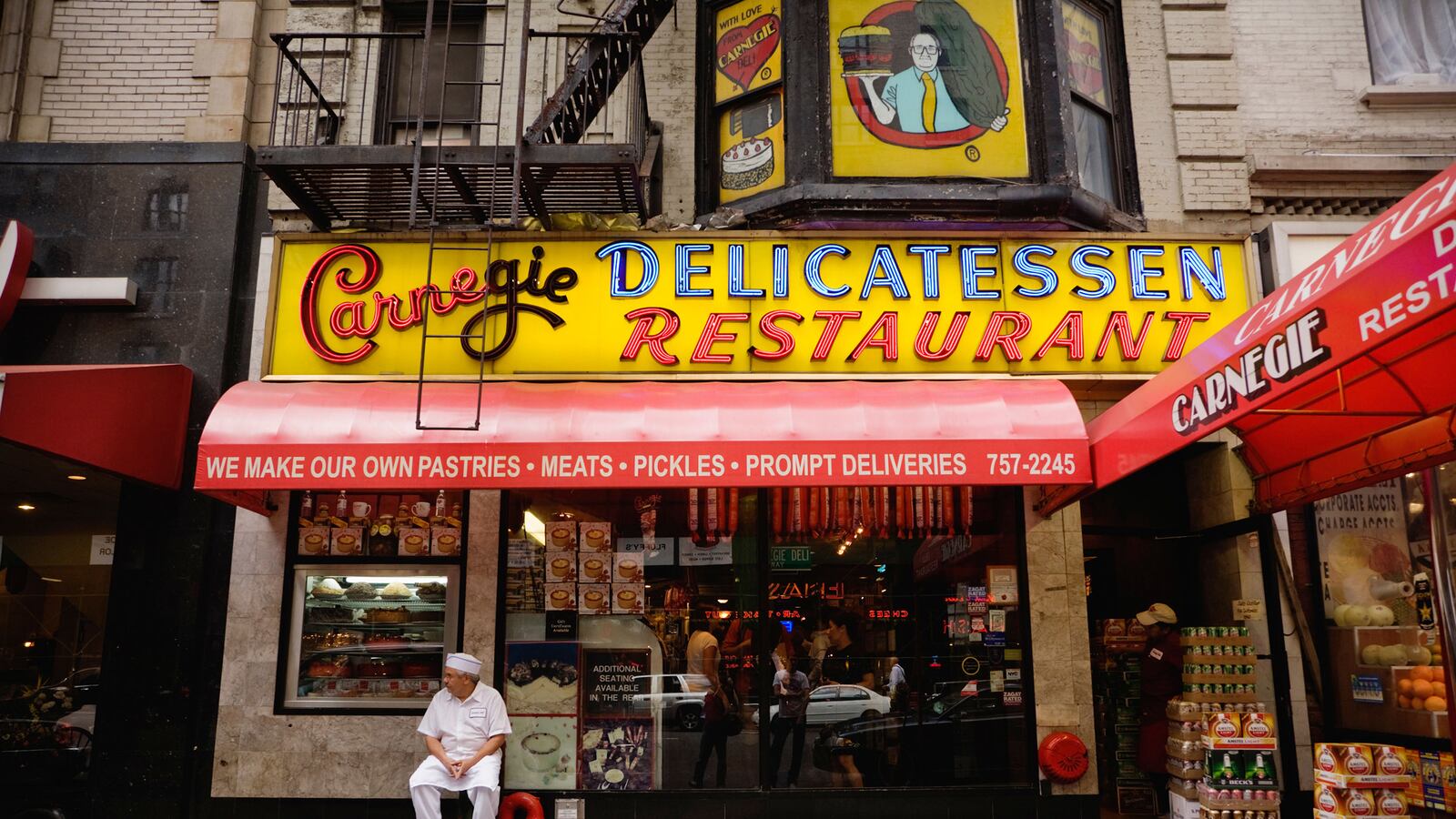“Will you miss the Carnegie Deli?” friends have asked me ever since it was announced that this delicious New York institution will close at the end of the year. How will I miss it? Let me count the ways.
First, of course, I will miss the food. Despite an off-moment now and then, I was never disappointed by the matzo ball soup, peppery pastrami, bay-scented corned beef, good caraway rye bread, full-sour pickles and green tomatoes, crisp and creamy cheese blintzes, and a tongue-and-egg pancake omelet made, as ordered, with center-cut slices.
For all meats the only seasoning needed was brassy bright yellow mustard—Dijon and whole grain need not apply. Hot tea with lemon was for me the best accompaniment to cut through the lusciously fat fare, especially if served in a glass, on request. (“What then, in a pail?” a wise-guy waitress once asked me.)
Second, the Carnegie represents a professional landmark for me. In March of 1979, in The New York Times, I reported on my two-month search for the best pastrami and corned beef sandwiches in Manhattan, Brooklyn, and Queens. To finally compare all the samples, my husband and I drove all around the city in one day to pick up the specimens. By the time we got home, we had 104 sandwiches in the car, and were lucky not to have been asphyxiated by the stifling aromas of garlic and hot meat.

The top winners were the Carnegie and the Pastrami King in Queens, which has since morphed into the still-excellent Pastrami Queen on the Upper East Side. Because the Carnegie was in Manhattan, when the news broke it drew the most customers who formed long lines to get a taste. (The lines rival the lines outside the deli today as devotees try for a final fix.)
Among those who lined up that first day was the legendary New York Times editor, A.M. “Abe” Rosenthal, who identified himself to the restaurant’s staff. He was immediately shown to a table where a paper napkin was quickly replaced by one of cloth. Early the next morning, Abe was at my desk, saying of all the honors accorded him in life, none meant as much as being given a cloth napkin at the Carnegie.
Third, and maybe most of all, as I age, I will miss the shtick, the schmoozy, New York-Broadway street dialogue of the afternoon habitués who killed time there one-upping each other. My two favorites were Frank Farrell, a much respected columnist for several local newspapers and Henny (“Take my wife, please…”) Youngman.
One drowsy afternoon when the place was half-full, he gazed around and announced, “The average age of the customer here is deceased.” Always happy to be repeating himself, Youngman intermittently retold one of his signature jokes. A man goes to the doctor and describes his symptoms. “Have you had that before?” the doctor asks. “Yes,” says the patient. “Well, you’ve got it again,” answers the doctor.
Alas, I was not present for one of the Carnegie’s most classic moments. Story goes that famed actor Zero Mostel, upon hearing someone order a pastrami on white bread with lettuce and a glass of milk, got up and shouted “Get out of this restaurant!” If not true in fact, it surely is in spirit.
In the end, of course, it was the two working partners who made the Carnegie what it was. There was the smiling, patient eagle-eyed Milty Parker at the register, thanking each guest as he or she complied with the cash-only policy. It is Marian Harper, Milty’s daughter, who is closing the restaurant because she says, at 68, she can no longer take the early morning to late night hours, and there seems to be no one else who will… or can.
But to the fressing public, it was the garrulous, adorable, sui generis Leo Steiner who set the mood and enhanced the schmoozing. He was at every table, greeting, suggesting, clearing, and nudging waitresses.

Among my favorites articles that I have written, none ranks higher than one for the bygone magazine, Manhattan, Inc. I set up two conversations between Leo of the Carnegie Deli and André Soltner of the late, lamented Lutèce on the problems of running a restaurant in New York.
I took Leo to Lutèce where he had never been, and Alsace-born André to the Carnegie where he had a pastrami sandwich for lunch many Saturdays when his restaurant was closed. Each walked the other through their kitchens and I will never forget the horror on André’s face when Leo advised him to use canned beets because their color was always uniform. And he was almost equally moved when in the Carnegie kitchen Leo explained that every year he burns through a huge Vulcan range, the model, incidentally that both favored.
When Leo explained the intense heat they cook with and their long hours from 6 a.m. to 4 a.m., André asked, “Who is waiting for you to open at 6 in the morning?”
“Hookers, film editors, show people, lawyers, night owls, and many on the way to early morning jobs,” answered Leo.
Most memorable perhaps about Leo was his many, highly creative malapropisms. Returning from a honeymoon with his beloved Irma Birnbaum, who called him “Lion,” he described driving over “the Grand Knish” in the south of France. A little research indicated that he meant the Grande Corniche, but it will always be a grand knish to me.





